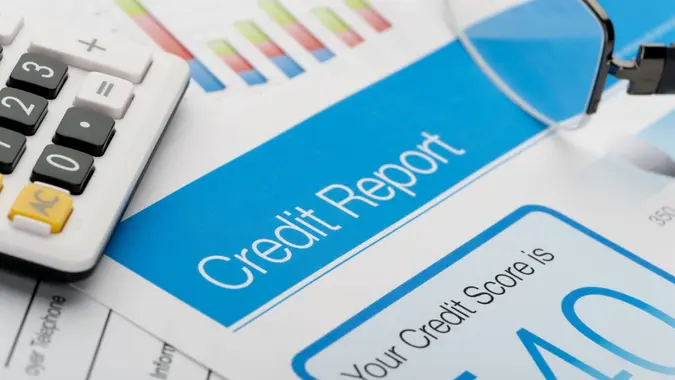9 Common Reasons Your Credit Score Drops and How to Fix It

Commitment to Our Readers
GOBankingRates' editorial team is committed to bringing you unbiased reviews and information. We use data-driven methodologies to evaluate financial products and services - our reviews and ratings are not influenced by advertisers. You can read more about our editorial guidelines and our products and services review methodology.

20 Years
Helping You Live Richer

Reviewed
by Experts

Trusted by
Millions of Readers
A drop in your credit score can be a temporary, minor occurrence or it can indicate something far more serious.
1. Missing a Payment
The more late payments you make — and the longer you take to make them — the more your score will suffer.
Your payment history is the single biggest individual component of your FICO score, at 35%.
2. Carrying a High Credit Card Balance
Your total debt comprises 30% of your FICO score. This is a large factor in your overall score. Hold off on large purchases until you can pay down some of your debt.
3. Applying for New Credit or Loans
Overall, your credit inquiries make up just 10% of your FICO score, but they can add up. Try not to apply for new credit unless you really need it.
If you’re shopping around for the best loan rates, put in all of your applications in the same week. That way, the credit bureaus will only look at it as one inquiry.
4. Closing an Account
Shutting down an old account can shorten your credit history, which makes up 15% of your FICO score.
5. Collections, Bankruptcies or Charge-Offs
These serious issues can drop your credit score by 100 points or more. They also stay on your credit report for seven years.
6. Mistake on Your Credit Report
Sometimes, a credit report is just wrong. It may list accounts that don’t truly belong to you or have otherwise inaccurate or outdated information. A few phone calls may be enough to resolve the issue.
7. Identity Theft or Fraud
One of the first places you can spot identity theft is on your credit report. If the thief runs up your balances or applies for new lines of credit in your name, it could damage your credit fast.
This is one of the main reasons you want to check your credit reports on a regular basis. The sooner you can contact the police and credit reporting agencies about the theft of your identity, the easier it will be to unwind the damage.
8. Credit Limit Decreased
If you’re constantly making late payments on your credit cards, the issuer might lower your credit limit.
That means your score will dip because of late payments and less available credit.
9. Paid Off a Loan
Although paying off a loan is a good thing, you’re left with fewer types of active credit accounts, which can lower your score a bit. You might also shorten your credit history.
How To Find Out Why Your Credit Score Dropped
If you ever experience a credit score drop, you should take these steps immediately:
- Step 1: Start by pulling your most recent credit report at AnnualCreditReport.com.
- Step 2: Look through it for any changes — like late payments, high balances or other red flags.
- Step 3: If possible, compare it to an older report to see what’s different.
Pro Tip
Many credit apps will show you a summary of what caused any score change, so you don’t have to dig too deep.
How Much Can Your Credit Score Drop?
The credit scoring formula is proprietary and can be hard to understand. However, here’s how much credit scores tend to change based on common occurrences:
- Minor changes like a new credit inquiry might only impact your score by a few points.
- More significant issues, like a missed payment, could lead to a drop of 50 points or more.
- Serious financial setbacks like bankruptcy could drag your score down by 100 points or more.
The higher your score is to begin with, the more noticeable the drop could be after something negative hits your report.
How To Prevent Future Credit Score Drops
Now that you have a better understanding of how credit works, it’s a good idea to take steps to protect your score:
- Set up payment reminders or use autopay to avoid missing a due date
- Try to keep your credit utilization under 30%
- Don’t open new credit accounts unless it’s absolutely necessary
- Check your credit reports often for errors
- Sign up for credit monitoring to get score alerts
FAQ
Here are the answers to some of the most frequently asked questions about credit score drops.- Why did my credit score drop for no reason?
- Credit scores do go up and down on a natural basis, but the monthly change should only be a few points. Credit scores don't drop dramatically, however, "for no reason."
- If there is a big drop, it means something serious has happened. If you don't remember missing any payments, exceeding your credit line, adding to your credit balance or taking out a new line of credit, check your credit report immediately.
- Can paying off a loan lower my credit score?
- Yes. If you pay off a loan and it disappears from your credit report, you no longer get credit for the low credit utilization of that loan or the total available credit. This can lower your credit score.
- How fast can I fix my credit score after it drops?
- You may be able to fix your credit score faster than you think. Obviously, if you file for bankruptcy, it can take years for your score to return to where it once was. But if you simply had a temporarily high balance, it can bounce back quickly if you pay that debt off.
- Do all credit score drops mean I did something wrong?
- No. Many credit score drops are due to reporting errors or fraud. However, all drops should be investigated, particularly if you don't think you're responsible for them.
Our in-house research team and on-site financial experts work together to create content that’s accurate, impartial, and up to date. We fact-check every single statistic, quote and fact using trusted primary resources to make sure the information we provide is correct. You can learn more about GOBankingRates’ processes and standards in our editorial policy.
 Written by
Written by  Edited by
Edited by 























